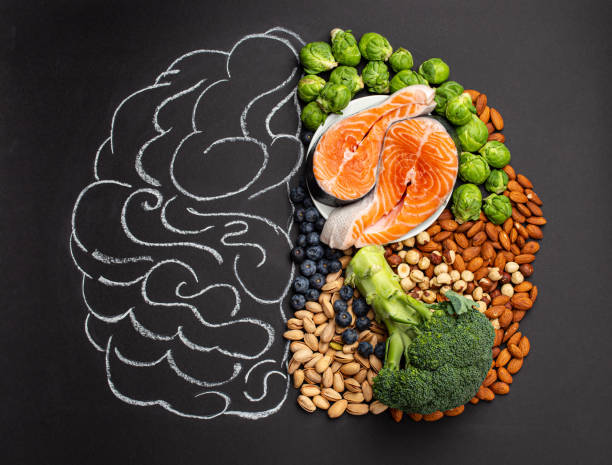Table of Contents
Nutrition plays a pivotal role in overall health, but its impact extends far beyond physical well-being. Emerging research underscores the significant influence of diet on mental health, revealing that what we eat can profoundly affect our mood, cognitive function, and overall mental well-being. This article explores how nutrition impacts mental health and offers practical dietary strategies to enhance mood and cognitive function.

The Gut-Brain Connection
One of the most fascinating discoveries in recent years is the gut-brain connection—the idea that the health of our gut influences our mental state. The gut microbiome, which comprises trillions of microorganisms in our digestive tract, communicates with the brain through various pathways, including the production of neurotransmitters and inflammatory signals.
1. Neurotransmitter Production: The gut microbiome produces neurotransmitters like serotonin and dopamine, which are crucial for regulating mood. For example, approximately 90% of serotonin, a neurotransmitter associated with mood regulation, is produced in the gut. A healthy gut microbiome supports the production and balance of these mood-regulating chemicals.
2. Inflammation: A poor diet high in processed foods and sugars can lead to chronic inflammation, which is linked to depression and cognitive decline. Conversely, a diet rich in anti-inflammatory foods can help reduce inflammation and improve mental health.

Essential Nutrients for Mental Health
Certain nutrients are particularly important for maintaining mental health and cognitive function. Incorporating these into your diet can support brain health and emotional well-being.
1. Omega-3 Fatty Acids: Found in fatty fish like salmon, as well as in flaxseeds and walnuts, omega-3 fatty acids are crucial for brain health. They have anti-inflammatory properties and are essential for maintaining the structure and function of brain cells. Research suggests that omega-3s can help reduce symptoms of depression and improve cognitive function.
2. B Vitamins: B vitamins, including B12, B6, and folate, play a key role in brain function and mental health. They are involved in the production of neurotransmitters and the regulation of homocysteine levels, which are associated with cognitive decline. Sources of B vitamins include whole grains, legumes, leafy greens, and animal products.
3. Vitamin D: Often called the “sunshine vitamin,” vitamin D is important for brain health and mood regulation. Low levels of vitamin D have been linked to an increased risk of depression and cognitive issues. Sun exposure, fortified foods, and supplements are common sources of vitamin D.
4. Antioxidants: Vitamins C and E, as well as other antioxidants found in fruits and vegetables, help protect the brain from oxidative stress and inflammation. Berries, citrus fruits, nuts, and green leafy vegetables are rich in antioxidants that support mental health.

Dietary Patterns for Mental Wellness
Adopting certain dietary patterns can enhance mental health and cognitive function. These patterns emphasize whole, nutrient-dense foods and are linked to improved mood and cognitive performance.
1. Mediterranean Diet: The Mediterranean diet, characterized by high consumption of fruits, vegetables, whole grains, nuts, seeds, and olive oil, is associated with lower rates of depression and cognitive decline. This diet’s emphasis on healthy fats, lean proteins, and antioxidant-rich foods supports brain health and emotional well-being.
2. DASH Diet: The Dietary Approaches to Stop Hypertension (DASH) diet, which focuses on reducing sodium intake and increasing the consumption of fruits, vegetables, whole grains, and lean proteins, has been linked to improved cognitive function and mood. Its focus on nutrient-rich foods helps support overall brain health.
3. Plant-Based Diets: Plant-based diets, including vegetarian and vegan diets, can provide a wide range of nutrients beneficial for mental health. Foods like legumes, nuts, seeds, and whole grains offer essential vitamins and minerals that support brain function and emotional balance.
Practical Tips for Eating for Mental Health
1. Eat a Balanced Diet: Aim to include a variety of nutrient-dense foods in your diet. Focus on whole grains, lean proteins, healthy fats, and a colorful array of fruits and vegetables. This balanced approach ensures you get a broad spectrum of essential nutrients.
2. Include Omega-3s: Incorporate sources of omega-3 fatty acids into your meals regularly. Enjoy fatty fish, such as salmon or mackerel, or consider plant-based sources like flaxseeds and chia seeds.
3. Avoid Excessive Sugar and Processed Foods: High sugar intake and processed foods can contribute to inflammation and negatively affect mood and cognition. Opt for whole, unprocessed foods and limit sugary snacks and beverages.
4. Stay Hydrated: Proper hydration is crucial for maintaining cognitive function and emotional balance. Drink plenty of water throughout the day and limit excessive caffeine and alcohol consumption.
5. Mindful Eating: Practice mindful eating by paying attention to your hunger cues, savoring your food, and eating without distractions. This approach helps improve digestion and fosters a positive relationship with food.

The Impact of Nutrition on Mental Health
Integrating nutrition into your mental health strategy offers a holistic approach to well-being. By understanding the connection between diet and mental health, you can make informed choices that support both your physical and emotional needs. Embrace nutrient-dense foods, adopt beneficial dietary patterns, and practice mindful eating to enhance your mood and cognitive function.
Nutrition is a powerful tool in promoting mental wellness. By prioritizing a balanced diet rich in essential nutrients, you can support brain health, improve mood, and optimize cognitive performance. Embrace these dietary strategies and discover how thoughtful eating can lead to a healthier, more vibrant life.

